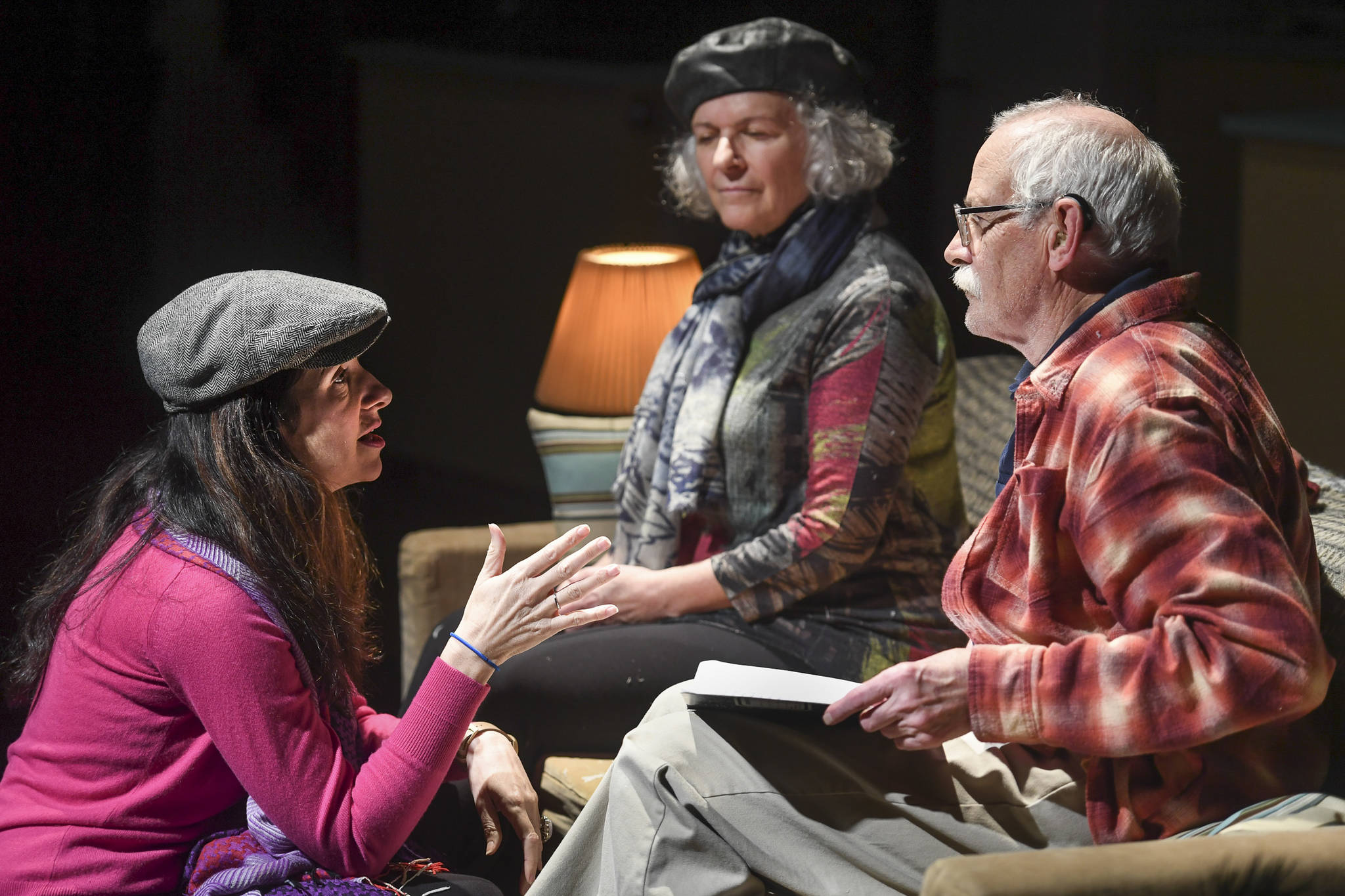Perseverance Theatre’s latest production is essentially the opposite of a candy-coated pain reliever.
“With,” a play about an age-addled husband and wife seeking relief from cancer and dementia in death, is coated in surface-level bitterness.
However, like the pill, that masks the one-act play’s truly sweet compassionate nature as well as healing that might be taking place.
Underneath its dark premise, “With” is an incredibly sweet, often funny play that uses a morbid starting point as both a hook and a microscope with which to examine the ways relationships shape human lives.
It will make audiences consider whether dying with dignity should be a universal right and the way our singular personal experiences are fundamentally altered by those outside our head space.
That’s almost entirely done through the play’s central couple Clifford (Charlie Cardwell) and Minnie (Angelina Fiordellisi), who are the only two people seen on stage.
Both are Midwestern archetypes of different sorts.
Clifford is a gruff man — his first F-bomb comes maybe a minute into the play — with a goofy streak that cuts through a penchant for saying things in a way that’s sometimes more brutal than brutally honest. He likes his screws sorted by length, and like all Midwestern fathers, cannot stand the site of an open door in a climate-controlled house. Clifford is also in the earlier stages of what is likely Alzheimer’s disease.
[New play portrays end of life ‘With’ unlikely laughs]
His wife of more than 60 years is Minnie. She’s a former creative writing teacher who is slightly more absent-minded than her husband. She’s doting, slightly silly and it takes an unlikely and extremely painful accident for her to utter obscenities. Minnie is the sort of good-natured person one imagines would be tickled by Dave Barry columns and “Marmaduke” cartoons. She is also battling cancer and is beginning to feel pain from a tumor that’s growing inside her.
Cardwell and Fiordellisi inhabit these characters in warm, lived-in ways that completely sell a decades-spanning shared history. Even when electric interference caused some audio problems during Friday’s opening night show, Minnie and Cliff stayed resolutely Minnie and Clifford, and the audience seemed to stay with them.
Clifford and Minnie aren’t perfect people, but in their actors’ hands, they’re likable and believable, even when playwright Carter Lewis’ words take short detours toward distractingly silly.
A blue joke about a goose down pillow that’s delivered as an aside to no one in particular and a wayward DVD of “Ally McBeal” stood out as amusing but expendable — especially when compared to the fine and affecting words throughout “With.”
One of the most interesting aspects of Lewis’ play is the way an unseen character serves as a cipher for the audience and a foil for Minnie and Clifford.
The couple’s wayward son is spoken of often in the play, but he’s never shown. Minnie’s tone toward him is always more charitable than Clifford’s, and a sense of curdled father-son relationship is palpable.
It’s the son who provides Minnie and Clifford with a potential means for ending their lives in a peaceful manner, but Minnie and Clifford have fundamentally different reads on why their son gave them the ingredients for a pharmaceutical cocktail.
Whether it was benevolence and an avenue for the terminally ill couple to make their exit with dignity, or a way to speed up the process of acquiring Minnie and Clifford’s home, is never made explicitly clear.
However, the dueling ideas clarify who Minnie and Clifford are and the way their contrasting worldviews ultimately open new possibilities and fresh considerations.
It goes a long way toward explaining how the sometimes crotchety duo could make it for over 60 years and why their unifying goal is dying with each other. Their differences are complementary and over the decades they’ve built a comfortable shared reality that’s unique to their Midwest home.
In that context, Minnie and Clifford define each other, and their desperation to cling together to the maybe-not-too-bitter end makes sense.
They’re better and more complete as individuals because of the differences that can clash when they’re together, and that’s ultimately the sweet central sentiment of “With” at first obscured by the play’s subject matter.
• Contact reporter Ben Hohenstatt at (907)523-2243 or bhohenstatt@juneauempire.com. Follow him on Twitter at @BenHohenstatt

